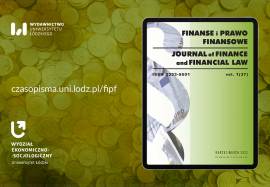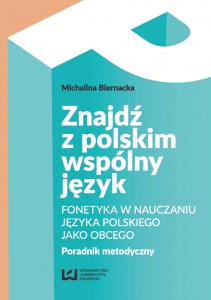Finanse i Prawo Finansowe/Journal of Finance and Financial Low | VOL. 1 (37) 2023
Opublikowano: 31 marca 2023

Kwartalnik Finanse i Prawo Finansowe/Journal of Finance and Financial Law jest recenzowanym czasopismem naukowym, w którym zamieszczane są oryginalne artykuły naukowe, często łączące teorię z praktyką, odnoszące się do finansów oraz powiązanych z nimi dziedzin. Łamy czasopisma są otwarte również dla przedstawicieli nauk prawnych, którzy podejmują tematykę regulacji finansowych. Celem czasopisma jest promowanie i publikowanie wyników badań z zakresu finansów, inspirowanie autorów, a także czytelników, do lepszego zrozumienia, zdefiniowania i wyjaśniania ważnych, w szczególności bieżących zjawisk oraz mechanizmów finansowych. Zadaniem czasopisma jest: udostępnienie forum do upowszechniania rezultatów badań oraz wymiany opinii, prezentacja indywidualnych i zespołowych dokonań naukowych.
Artykułowi opublikowanemu w czasopiśmie Kwartalnik Finanse i Prawo Finansowe/Journal of Finance and Financial Law przyznawane jest 40 pkt.
The Impact of COVID-19 Cases on Stock Prices of Selected Companies Representing Tourism and Banking Sectors
Volkan Dayan, Monika Bolek, Juan E. Trinidad-Segovia
The purpose of the article/hypothesis: The purpose of the article is to analyse the relationship between stock prices of selected companies and COVID-19 cases in those countries where the tourism and banking sectors have a high share of national income, such as Croatia, Italy and Spain. Methodology: The methods used are Breakpoint Unit Root Tests to determine whether a time series is stationary or not, and ARDL cointegration technique for cointegration testing. Results of the research: It was found that the number of COVID-19 cases negatively impacted the tourism and banking market in surveyed EU countries.
Significance of the Founding Body (Ownership Authority) for Financial Performance of Hospitals in Poland – Evidence from County and Provincial Hospitals
Bartłomiej Krzeczewski
The purpose of the article/hypothesis: The purpose of the article is to identify and assess differences in the financial performance of Polish hospitals according to the type of the founding body. Research hypothesis assumes that the founding body is of great importance for the hospital’s financial condition. Methodology: Selected financial ratios illustrating various areas of financial performance of the analyzed units are used in the study. Statistical significance is also verified in terms of differences between the mean values of indicators characterizing the financial performance of hospitals. The study is conducted on the example of public hospitals subordinated to provinces (voivodships) and counties (poviats). Results of the research: The assessment of the financial performance shows that the situation of the provincial hospitals seems to be slightly better than that of the county ones. In addition, the study shows significant differences between the analyzed groups of hospitals within the areas of debt, as well as in the case of cash (immediate) financial liquidity, which allows only to partially accept the research hypothesis. In case of current and quick liquidity, as well as obtained profitability, unambiguous verification of the hypothesis is not possible.
Analiza i ocena płynności finansowej spółek o niskiej wartości rynkowej notowanych na GPW w Warszawie
Andrzej Kuciński
Cel: Celem niniejszego artykułu jest analiza i ocena płynności finansowej spółek giełdowych o niskiej kapitalizacji, których wartość rynkowa nie przekraczała 20 mln złotych. W opracowaniu za hipotezę przyjęto to, że spółki o niskiej wartości rynkowej notowane na Rynku Głównym GPW w Warszawie utrzymują niskie poziomy wskaźników płynności finansowej, które przekładają się na negatywną ocenę płynności finansowej. Metodyka/podejście badawcze: Badaniem objęto spółki notowane na Rynku Głównym GPW w Warszawie, których wartość rynkowa była mniejsza niż 20 mln złotych. Badaniem objęto lata 2018–2020. W badaniu wykorzystano klasyczne narzędzia stosowane przy ewaluacji płynności finansowej przedsiębiorstw: wskaźnik bieżącej płynności, wskaźnik płynności szybkiej, wskaźnik płynności gotówkowej oraz narzędzia statystyki opisowej. Wyniki: Na podstawie przeprowadzonych badań ustalono, że spółki o małej kapitalizacji rynkowej notowane na Rynku Głównym GPW w Warszawie utrzymują wskaźniki płynności finansowej, które są często poniżej teoretycznych wartości. Oznacza to, że działalności spółek, których wartość rynkowa była mniejsza niż 20 mln złotych towarzyszy podwyższone ryzyko utraty wypłacalności, co przekłada się na gorszą ocenę sytuacji finansowej przedsiębiorstw oraz ich niską wycenę rynkową. Ponadto na podstawie przeprowadzonych badań wykazano duże zróżnicowanie płynności finansowej w ujęciu sektorowym przedsiębiorstw.
Civil Liability Insurance for Users of Personal Transport Equipment (PTE) as an Element of Protection for Sharing Economy Participants
Iwona Laskowska, Stanisław Wieteska, Juszczyk Juszczyk
The purpose of the article/hypothesis: In recent years, there has been a noticeable and dynamic development of micromobile equipment intended for the transport of people. These types of vehicles are known as personal transport equipment (PTE). Like any road vehicle, PTE can also cause numerous accidents and collisions. A natural consequence of damage related to the use of PTE is posing the question about securing the interests of the aggrieved parties. Considering the above, the aim of this paper is to present the role of civil liability insurance for users of personal transport equipment in the context of claims related to the use of this type of vehicles and to provide a brief description of insurance products available on the market. The paper presents the following thesis: although the regulations do not oblige PTE users to have a civil liability insurance policy, a wide catalogue of adverse events related to the PTE use requires the popularisation of insurance protection for users of this type of vehicles. Such insurance protection should cover: equipment users, renters, sellers, and operators, as well as households. Methodology: The paper is theoretical and analytical in its nature. In addition to the review of the available literature, the existing offer of voluntary insurance for PTE users is also analysed. Results of the research: Insurance addressed to users of personal transport equipment is a relatively new product on the market and still few insurance companies have it in their offer. PTE users can utilise their civil liability insurance often being part of their home insurance in their private life, which offers protection in the event of damage to third parties. One of the solutions leading to the dissemination of insurance protection could be a proposal of insurance tailored to the type of risk and short-term use associated with this kind of equipment (e.g. travel-type insurance).
Digital Banking Transformation Through Cooperation with Fintech Startups in Ukraine
Sophia Lobozynska, Ulyana Vladychyn, Iryna Skomorovych
The purpose of the article/hypothesis: Is to identify the peculiarities of Fintech startups activities, to track trends and perspectives of interaction between classic banks and Fintech companies, as well as to research the activities of neobanks and formulate proposals for improving the Fintech ecosystem in Ukraine with the aim of providing quality digital financial services to various categories of consumers. Methodology: Methods of statistical analysis, analogy, synthesis and theoretical generalization were used when researching the materials of specialized analytical agencies, official websites of foreign and domestic banks, state financial strategies and scientific literature. Results of the research: The active growth of a number of Fintech startups in the world and in Ukraine forms a positive dynamic of the digital transformation of the banking sector. The cooperation between banks and Fintechs allows the use new innovative products in banking, such as artificial intelligence, robo-consultation, blockchain, cryptocurrencies, the Internet of Things, virtual and augmented reality. For the further digital transformation of banking in Ukraine the financial market participants must implement international open banking standards and tools for remote identification and verification of clients, actively introduce artificial intelligence and machine learning tools into finance, and develop a Fintech ecosystem.
Consequences of Changes in Consumer Bankruptcy Regulations
Joanna Stępińska
The purpose of the article/hypothesis: The aim of the article is to review and present changes to the consumer bankruptcy law and the implications of these changes for individual debtors. Methodology: The study deals with the effects of bankruptcy proceedings against individual debtors who do not conduct business activity (remission of bankrupt’s liabilities, or at least partial repayment of creditors by the debtors) together with the analysis of changes in the law. It will be used to verify the hypothesis that the liberalization of regulations has resulted in an increase in the number of consumer bankruptcy petitions filed, as well as open bankruptcy proceedings conducted against individual debtors. Results of the research: The results of the analysis presented in the paper support the hypothesis that the liberalization of regulations in the area of consumer bankruptcy has resulted in a significant increase in the number of consumer bankruptcy petitions and open bankruptcy proceedings against individual debtors. It seems that as crucial as creating a possibility for the indebted to return to normality in the form of consumer bankruptcy, it is equally important to take care of the sense of equality in this process. It is vital to be aware that consumer debt relief comes at the expense of other market participants – obviously direct creditors but the general public as well.
Sustainable Finance – Where we are and how we can go further
Marika Ziemba
The purpose of the article/hypothesis: The purpose of the paper is to present the historical background of sustainable development and importance of sustainable finance, and to discuss the most important challenges currently facing sustainable finance. The article verifies the research hypothesis: recent changes (implementing of the EBA Action Plan, the Sustainable Finance Disclosure Regulations and facing the COVID-19) in the finance sector can help institutions pursue an effective, sustainable development policy. Methodology: The article contains an extensive literature review of the sustainable development policy (including legal acts). Results of the research: Sustainable development in the finance sector plays an important role and is currently facing three main challenges: the implementation of the EBA Action Plan, the Sustainable Finance Disclosure Regulation and COVID-19. The EBA Action Plan and SFDRs may initially require financial institutions to change their policy and thus complicate their operations, but later bring only benefits (e.g. transparency). On the other hand, the COVID-19 pandemic is a significant obstacle to the implementation of the sustainable development policy due to countries and entities focused on fighting this threat (including using financial resources). However, it should be mentioned that sustainable development brings long-term effects (including more effective development), thanks to which companies can achieve the desired benefits and overcome the obstacles and crises caused by the pandemic and future crisis.
Do External Debt and Foreign Direct Investment (FDI) Inflow support Economic Growth? Evidence from Ghana
Evans Yeboah, Dastan Bamwesigye, Seval Ozbalci, Francis Atiso
The purpose of the article/hypothesis: The prime objective of this study is to discover whether external debt and foreign direct investment promote economic development. The paper investigates whether external debt and foreign direct investment inflows stimulate economic growth, intending to determine the causal relationship between the variables to serve as a substantial factor for policymakers. Methodology: Numerous econometrics techniques were employed to ensure the findings’ effectiveness and accuracy, including the stationarity test, Johansen cointegration test, and multiple regression (ordinary least squares). The hypothesis test that external debt and foreign direct investment inflows do not attain their justification of ensuring economic growth was conducted empirically. Results of the research: The outcome revealed that external debt and foreign direct investment positively and significantly support Ghana’s economic growth. This leads to the conclusion that these variables fulfilled their purpose.
Quarterly Supplement
Zuzanna Pakuła, Patryk Krykwiński, Anna Peruga, Radosław Witczak, Artur Zimny
Dodatek kwartalny
Zuzanna Pakuła, Patryk Krykwiński, Anna Peruga, Radosław Witczak, Artur Zimny
Zapraszamy do lektury tomu!
Komentarze
Ten post dostępny jest także w języku: angielski





